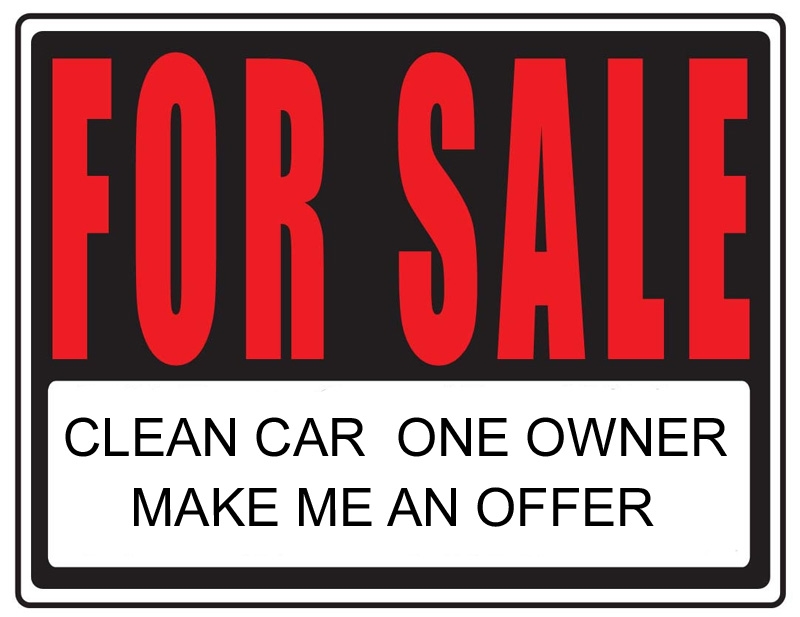
If you have a car that you need to dispose of but don't want to take the time to retail it yourself, you can potentially sell it to a dealership even if you aren't purchasing a new vehicle from them. Generally, there will be a spread between what you could reasonably sell a car for on the open market and what a dealership will pay you for it. For some people, giving up this margin is worth it to avoid the potential hassles involved in dealing with the public on a used car sale.
Walk around your car and make an unbiased evaluation of its condition. Look at the tires; will they be in need of replacement soon? Virtually any consumer will factor in the cost of new tires into their offering price and the dealer will do that as well when they are evaluating a car for purchase. Tires with less than half of their useful life left reduces the value of a car. Does the body have an abundance of nicks, scrapes and scratches? Eye appeal sells cars and one that is scarred up will sell for less than one with a near perfect exterior and interior even if their overall mechanical condition is the same. Is the interior clean without any tears in the trim or upholstery? Most people don't mind getting into a dirty car seat that they created, but getting into someone else's filth is another matter entirely.
Do your research to get an idea of what trade-in values are for your car. Keep in mind that the used car market can be very volatile and significant price swings can take place in weeks or even days. The two main valuation services reflect transactions that took place more than a month ago, closer to 90 days in some instances, so they will not necessarily reflect current market conditions. Dealers base their bid prices on the wholesale marketplace which consumers don't have ready access to. Put yourself in the dealer's shoes; they won't pay you $10,000 if they can get a similar vehicle on the wholesale market for $8,000. They need to have the opportunity to make a reasonable profit on any cars they purchase or they won't buy them. $500 to $1,000 is not enough profit on average to keep them in business so plan on them wanting to make more than that. If you are not willing to allow that level of profit then you should consider trying to sell the car yourself.
Invest some time and money making your car more salable. Use the information you gleaned from step number one and spiff up your vehicle before you start shopping for a buyer. Have the car detailed making sure that the detailer buffs out any light scratches. Do not do paint touch-up with a brush applicator. The dealer has access to companies that will do a professional job of paint touch-up. Having stone chips present is better than having a poor touch-up job in place. Replace the tires if worn to within 30 percent of their useful lifetime or if you have mismatched tires. Have any chips fixed in the windshield. Many insurance companies will so chip repair for free if you meet certain comprehensive deductible limitations. If your windshield is cracked, replace it. Don't spend more than 3 to 5 percent of the car's estimated value doing reconditioning because you will typically not be able to recoup more than that level of expenditure.
Take your car to two or three franchised dealers who sell your make of vehicle new. Ask for the used car manager and ask him if he is interested in giving you a buy-big for your car. A buy-bid is a firm offer to buy that almost always has an expiration date attached to it. Ten days is typical, but make sure you confirm the date with the dealer if he offers to buy your car. If he is interested in giving you a bid he will likely want to do a visual inspection of the car as well as a short test drive. If he offers to buy it ask him to give you the bid in writing and don't forget to get his business card. After getting your first bid, go to two more franchised dealers for the brand and complete the process again. If there is an independent used car dealer in your area who seems to specialize in the brand get their opinion as well.Generally, three bids will almost always give you an accurate idea of the marketplace. Getting more than five bids is usually a waste of time.Tell the dealer if there is a loan pay-off on the vehicle. Some states have restrictions in place that will not allow a dealer to sell a car unless they have the title in hand. Having to make a loan pay-off can delay receiving the title by 30 days or more. That delay can have an effect on the bid they give you.
Sell the car to the high bidder if you are satisfied with the bids and still want to complete the transaction. Bring your title, copy of the registration and any loan account numbers with you to the closing.